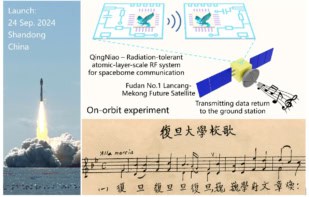From cultural differences to grant glitches, Elizabeth Tasker describes the good, the bad and the confusing of working as a physicist in Japan

“Dear Christoph and …” – my fingers paused on the keyboard. I was typing an e-mail to my graduate student and our German research collaborator. Despite this being a rather mundane, everyday task, it was causing me a headache. Like myself, Christoph was a member of his university’s faculty. Since academics typically use casual forms of address, I had called him by his first name for many years. My student’s name was Keitaro Jin, but I had never once called him “Keitaro”. Instead, I followed the Japanese norm of using his family name plus the suffix “-san”. Roughly speaking, “Jin-san” translates to “Mr Jin”. But addressing the e-mail to “Dear Christoph and Jin-san” would look equally bizarre in both cultures. It was a strange conundrum, but a rather typical one as a physicist working in Japan.
I had first visited Japan in 2009, spending four months at the National Astronomical Observatory of Japan (NAOJ) in Tokyo on a short-term postdoctoral fellowship funded by the Japan Society for the Promotion of Science (JSPS). I had loved my stay, and asked my adviser at the end of my visit about the possibility of returning. “You can come back to Japan,” I was told. “But only for a postdoctoral position, not for a faculty job.” The issue was that Japanese universities taught in the native language. Supporting a faculty member who could not speak fluent Japanese was therefore an impractical burden for most departments. However, at the start of 2011, I received an invitation from Hokkaido University to apply for a newly opened assistant professor position. It was a positive discrimination appointment, which favoured both female and foreign applicants. This change in protocol was due to a government initiative, and driven by necessity. In 2009 Nature published an article (460 151) declaring that Japan was at a “tipping point”. With a decreasing workforce and dropping science uptake at university, Japan had to either tap into its underused resource of female and international researchers, or tumble from the top ranks of nations involved in scientific research. This situation led to a spurt of government-supported programmes to recruit from these two pools, and offer more courses at university level taught in English. Despite these efforts, the same warning was repeated in the 2017 Nature Index, reflecting that Japan still has further to go.
In truth, nobody likes positive discrimination appointments. There is a concern (heightened by the ever-present imposter syndrome) that those who take such a position will be seen as weaker than their contemporaries, due to being selected from a reduced pool of applicants. However, one year after taking up my position at Hokkaido University, I was in no doubt about the importance of such schemes.
One of my first graduate students was initially so nervous about his English, he used an auto-translator to compose e-mails to me. Once he realized I cared nothing about broken grammar, and that a combination of charades and white-board Pictionary was an amazing way to communicate science, he relaxed. Two years later, he opted to present and write his Master’s thesis in English; a venture so successful he won the department award for best graduate presentation. Another of my students concluded his degree by engaging in a deep debate with me about the differences between American and British spelling (the point where I had to reach for a dictionary was when I decided my job was done). And a female graduate student in our group told me she would never have tried to become an astronomer if she had not met me. It was an emotional moment.
Of course, I could have supervised students anywhere in the world, and I hope I would have made a positive impact on their careers. But being in Japan gave my skillset a boost: I was able to offer expertise that was not shared by all my colleagues and, sometimes, I simply represent a choice that not all students had considered.
Not everything was smooth sailing. In addition to amusing conundrums regarding the culturally correct way to address someone via e-mail, I found that language and cultural misunderstandings occasionally resulted in more serious issues. The textbooks for my course were not ordered until a month after I started teaching. The required syllabus was never clearly described, nor the expected knowledge of the students. In the end, I started with a maths test of successively harder questions and waited for the students to turn green (to my first set of students, I can only apologise).
Cultural differences also meant that I was frequently teaching on Christmas Day, and I once had to rearrange accommodation options for an international meeting after I realized it was assumed invited senior researchers would be happy sharing rooms of four (shared sleeping can be common in Japanese hotels). There was also a more serious incident when a misunderstanding concerning a research grant resulted in me having to inform my two newly hired postdoctoral researchers that I could only fund them for 18 months, not three years. That was the closest I ever came to quitting.
However, support for international faculty has noticeably improved over the six years I have lived in Japan. Hokkaido University created a dedicated support office for its international science researchers, which solved all my serious problems. There is slightly newer but similar support at the Institute of Space and Astronautical Science at the Japan Aerospace Exploration Agency in Tokyo, where I moved last year.
That I have moved here and stayed is testimony to the fact I find the advantages of Japan far in excess of the troubles, although it notably helps to have a slightly devil-may-care outlook! While Japan may still be struggling to find its place on today’s global stage, the fact it belongs there is unequivocally reflected in the nine Japanese physicists who have been awarded a Nobel prize since 2000, not to mention the others in chemistry and medicine. To be part of this country’s future is undoubtedly an incredible opportunity.



